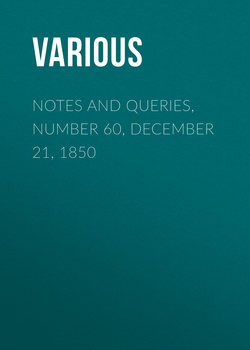Читать книгу Notes and Queries, Number 60, December 21, 1850 - Various - Страница 2
Minor Notes
ОглавлениеTrue or False Papal Bulls.—
"Utrum bulla papalis sit vera an non.
"Si vis scire utrum literæ domini Papæ sint veraces vel non, numera punctos quæ sunt in bulla. Et si inveneris circulum ubi sunt capita apostolorum habentem 73 punctos, alium vero circulum 46, alium super caput Beati Petri habentem 26, alium super caput Sancti Pauli habentem 25 punctos, et punctos quæ sunt in barbâ 26, veraces sunt; alioquin falsæ.—Sir Matthew Hale's Manuscripts, Library of Lincoln's Inn, vol. lxxiii. p. 176.
To which may be added, that in digging for the foundations of the new (or present) London Bridge, an instrument was dug up for counterfeiting the seals or Bullæ? Where is it now deposited?
J.E.
Burning Bush of Sinai.—
"Pococke asserts that the monks have planted in their garden a bush similar to those which grow in Europe, and that by the most ridiculous imposture, they hesitate not to affirm that it is the same which Moses saw—the miraculous bush. The assertion is false, and the alleged fact a mere invention."—Geramb's Pilgrimage to Palestine, &c., English trans.
March 1. 1847. The bush was exhibited by two of the monks at the back of the eastern apse of the church, but having its root within the walls of the chapel of the burning bush. It was the common English bramble, not more than two years old, and in a very sickly state, as the monks allowed the leaves to be plucked by the English party then in the convent. The plant grows on the mountain, and therefore could be easily replaced.
Viator.
The Crocodile (Vol. ii., p. 277.).—February, 1847, a small crocodile was seen in the channel, between the island of Rhoda and the right bank of the Nile.
Viator.
Umbrella.—It was introduced at Bristol about 1780. A lady, now eighty-three years of age, remembers its first appearance, which occasioned a great sensation. Its colour was red, and it probably came from Leghorn, with which place Bristol at that time maintained a great trade. Leghorn has been called Bristol on a visit to Italy.
Viator.
Rollin's Ancient History, and History of the Arts and Sciences.—Your correspondent Iota inquires (Vol. ii., p. 357.), "How comes it that the editions" (of Rollin) "since 1740 have been so castrated?" i.e. divested of an integral portion of the work, the History of the Arts and Sciences. It is not easy to state how this has come to pass. During the last century comparatively little interest was felt in the subjects embraced in the History of the Arts and Sciences; and probably the publishers might on that account omit this portion, with the view of making the book cheaper and more saleable. It is more difficult to assign any reason why Rollin's Prefaces to the various sections of his History should have been mutilated and manufactured into a general Introduction or Preface, to make up which the whole of chap. iii. book x. was also taken out of its proper place and order. A more remarkable instance of merciless distortion of an author's labours is not to be found in the records of literature. Iota may take it as a fact—and that a remarkable one—that since 1740 there had appeared no edition of Rollin having any claim to integrity, until the one edited by Bell, and published by Blackie, in 1826, and reissued in 1837.
Veritas.
Glasgow, Dec. 7. 1850.
MSS. of Locke.—E.A. Sandford, Esq., of Nynehead, near Taunton, has a number of valuable letters, and other papers, of Locke, and also an original MS. of his Treatise on Education. Locke was much at Chipley in that neighbourhood, for the possessor of which this treatise was, I believe composed.
W.C. Trevelyan.
The Letter ⌧.—Dr. Todd, in his Apology for the Lollards, published by the Camden Society, alludes to the pronunciation of the old letter ⌧ in various words, and remarks that "it has been altogether dropped in the modern spelling of ⌧erþ, 'earth,' fru⌧t, 'fruit,' ⌧erle, 'earl,' abi⌧d, 'abide.'" The Doctor is, however, mistaken; for I have heard the words "earl" and "earth" repeatedly pronounced, in Warwickshire, yarl and yarth.
J.R.
A Hint to Publishers (Vol. ii., p. 439.) reminds me of a particular grievance in Alison's History of Europe. I have the first edition, but delay binding it, there being no index. Two other editions have since been published, possessing each an index. Surely the patrons and possessors of the first have a claim upon the Messrs. Blackwood, independent of the probability of its repaying them as a business transaction.
T.S.
